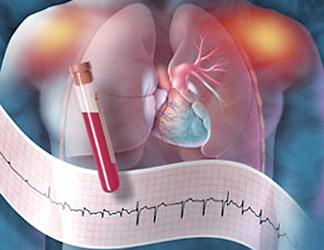摘要:在对妇女健康研究参与者的一项随访中,那些出现新发心房颤动的似乎健康的中年妇女与心血管疾病、非心血管疾病及全因死亡风险的增加有关系,这些风险中有些可由非致命性心血管事件来解释。研究报告发表在5月25日的《美国医学会杂志》(JAMA)上。

“心房颤动(AF)“是最常见的心律失常。其发生率会随着时间的推移而明显地增加。(图)
"Atrial fibrillation (AF) is the most common cardiac arrhythmia, and its prevalence is markedly increasing over time. Substantial evidence exists that the risk of stroke, congestive heart failure (CHF), and cognitive dysfunction is higher in patients with AF, underscoring the importance of AF as a public health problem. In addition, several studies involving mainly older individuals with and without cardiovascular disease found an increased risk of death in patients with AF," the authors write. "The risks associated with new-onset AF among middle-aged women and populations with a low comorbidity [co-existing illness] burden are poorly defined."
David Conen, M.D., M.P.H., of University Hospital, Basel, Switzerland, and colleagues conducted a study with data from the Women's Health Study to assess the risk of death and cardiovascular events among initially healthy middle-aged women with new-onset AF. Between 1993 and March 2010, 34,722 women participating in the Women's Health Study underwent prospective follow-up. Participants were 95 percent white, older than 45 years (median [midpoint], 53 years), and free of AF and cardiovascular disease at the beginning of the study.
During a median follow-up of 15.4 years, 1,011 women developed AF. Also, there were a total of 1,602 deaths from all causes, including 63 deaths among women in the new onset AF group. The authors' analysis indicated that the age-adjusted relative risk of all-cause, cardiovascular, and noncardiovascular mortality was significantly higher among women with new-onset AF. "Adjustment for nonfatal cardiovascular events potentially on the causal pathway to death attenuated [weakened] these relationships, but new-onset AF remained significantly associated with all mortality components," the authors write. They add that these findings suggest that this increased risk is partly mediated through the occurrence of nonfatal cardiovascular disease, particularly the development of CHF and stroke.
"In this large cohort of initially healthy women at low risk of cardiovascular disease, women with new-onset AF had an increased risk of death and incident cardiovascular events. Because a significant proportion of the excess mortality risk appears attributable to the occurrence of nonfatal cardiovascular events prior to death, there is a potential opportunity to improve the outcome of individuals with new-onset AF through both prevention and optimal management of these associated comorbidities," the authors conclude.
Editorial: Mortality Risk Among Middle-aged Women With First Atrial Fibrillation
In an accompanying editorial, Yoko Miyasaka, M.D., Ph.D., of Kansai Medical University, Hirakata, Japan, and Teresa S. M. Tsang, M.D., of the University of British Columbia, Vancouver, Canada, comment on the findings of this study.
"The report by Conen and colleagues provides compelling evidence that the first detection of AF in otherwise event-free middle-aged women is associated with a significantly increased mortality risk, which may reflect an existing higher cardiovascular risk burden including subclinical structural substrates of AF. Whether treatment of AF including stroke prevention and aggressive management of cardiovascular risk factors can reverse the mortality risk associated with AF among these women awaits future studies."







